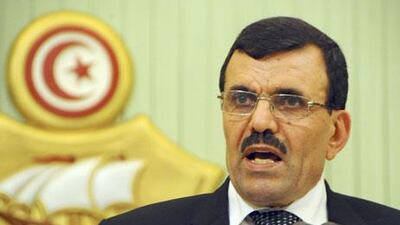TUNIS // Tunisia's prime minister-designate announced an interim cabinet yesterday, after more than two weeks of tense negotiations between the leading Islamist party and smaller political groups.
In an apparent concession to opponents of the Islamists, the new government contains fewer members of the Ennahda party than the previous interim body, and has appointed independents to run the key interior and justice ministries.
The cabinet, faced with the double challenge of fixing the nation's economic and security woes, will be submitted for approval to the parliament, probably early next week.
Ennahda said on its Facebook page only 28 per cent of the government was from the party, down from 40 per cent.
Lotfi Ben Jeddou, a lawyer, and Nadhir Ben Ammou, a professor, will become interior and justice ministers.
Ennahda's coalition with the centre-left Ettakatol and president Moncef Marzouki's secular Congress for the Republic continues.
Speaking at the presidential palace, the new prime minister Ali Larayedh, until recently the interior minister, called for a constitution to be completed and national elections to be this year, probably in October or November.
"Our country needs national unity," Mr Larayedh said. "You must be patient. The road to democracy is long."
Tunisians hope the new cabinet will be able to end a long period of political drift. The government has been sluggish to enact urgently needed reforms to the justice system and security forces.
The constitution, which was to be completed by last September, has been delayed by deep ideological wrangles between legislators about how Tunisia should be run.
A long impasse over a reshuffle tipped into near-chaos early last month with the assassination of Chokri Belaid, a secular opposition figure, outside his home in Tunis.
Thousands protested in the streets and at Belaid's funeral, blaming Ennahda for letting security deteriorate to a point where an unarmed man could be shot dead outside his home.
Assassinations, especially political killings, are all but unknown in Tunisia, where few people carry guns.
The crisis escalated as counter-demonstrations in support of the government began.
Independent Islamist and pro-revolution groups took to the streets to "patrol" and the prime minister Hamadi Jebali broke with his party to call for a technocratic, apolitical government.
The country seemed as divided and insecure as at any time in the two years since peaceful demonstrations overthrew president Zine El Abidine Ben Ali.
But with the cabinet now likely to be approved by Ennahda's members and their secular coalition allies in the national constituent assembly, there is a chance the new faces can try to address the ingrained economic and growing security problems.
"The important thing is political violence," said Asma Nouaira, a public law professor at Tunis University. "We have two big problems now, in the economic field and in security.
"If they can solve both of these problems, we can go ahead to the next election. If not, it will be a big problem for us."
Prof Nouaira said the new government should try to build good relations with Tunisia's diverse civil society, which is active in organising demonstrations, and particularly with the powerful labour unions.
While she had doubts about the appointment of Mr Larayedh, who was criticised while running the interior ministry for not reforming the security forces, she said she "wished him luck" as Tunisia needed to move on from months of political stalemate.
Religious issues and particularly the rise of hardline Islamist groups, including Ansar Al Sharia - thought to be behind an attack on the US Embassy in September - have been the key part of the political debate over the past year.
But studies suggest ordinary Tunisians mainly hope the new government will address economic problems. When the uprisings that began the wave of Arab unrest began in 2011, the causes were primarily economic.
A survey conducted at the end of last year for the International Republican Institute showed 60 per cent gave economic issues as their first answer when asked what the priority of the government should be, compared with only 12 per cent who replied security.
The country's credit rating has been repeatedly downgraded by ratings agencies, most recently by Moody's Investors Service on February 28.
The agency gave increasing political instability and delay in passing a constitution and organising an election as the reasons for its decision.
Tunisia's tourist business, once a key sector, has also suffered badly after the unrest, affecting hundreds of thousands of people who work in the industry.

